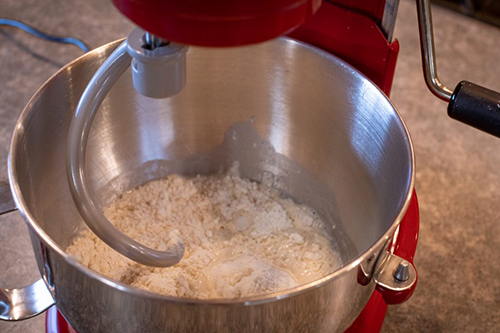


Welcome to My Blog!
Before we dive into the content, if you’re interested in our products or have any questions, please feel free to visit our Contact Us page on the website. Our team is ready to assist you with inquiries, orders, or any support you may need.
Now, let’s get started on our journey together. I hope you find the content here insightful, engaging, and valuable.

Selecting the right donut mixer for your bakery is a crucial step in ensuring consistent product quality and boosting production efficiency. Doughnut mixers are designed to blend dough ingredients to the perfect consistency, delivering the ideal texture and taste every time. Whether you’re making yeast-raised doughnuts or cake doughnuts, a high-quality mixer simplifies your production process and reduces labor costs.
In this article, we’ll delve into the factors to consider before purchasing a doughnut mixer and how the right choice can boost your bakery’s output.
The first thing to consider is the capacity of the doughnut mixer. Does your bakery produce large volumes of donuts daily, or are you operating on a smaller scale? Donut mixers come in different sizes to accommodate varying production demands. For high-volume bakeries, choosing a donut mixer with a larger bowl capacity will ensure that you can meet production needs without compromising dough quality.
When it comes to choosing between a planetary or spiral doughnut mixer, it’s important to understand the difference. Planetary mixers are versatile and can be used for a wide range of bakery products, including donuts. They mix the dough in a planetary motion, ensuring thorough mixing. On the other hand, spiral mixers are specifically designed to handle heavier doughs like those used for yeast-leavened donuts, providing more efficient mixing.
Another key feature to look for is adjustable mixing speeds. The ability to control mixing speed allows you to customize the texture of your dough. For example, slower speeds are ideal for incorporating dry ingredients, while higher speeds help achieve the perfect dough consistency. Choose a donut mixer with digital controls or multiple speed settings to provide the flexibility your bakery requires.
A high-quality donut mixer ensures that each batch of dough is mixed to the same level of consistency, leading to donuts with uniform texture and taste. This is particularly important for bakeries that rely on delivering a consistent product to customers.
By investing in a commercial-grade doughnut mixer, you can significantly reduce the amount of time spent mixing dough by hand. These mixers can handle large batches quickly, improving overall production efficiency and allowing you to focus on other aspects of your bakery.
A durable and reliable donut mixer will last for years, saving you money in the long run. Commercial mixers are built to withstand the rigors of daily use in high-volume bakeries, providing excellent value for your investment.
| Feature | Planetary Donut Mixer | Spiral Donut Mixer |
|---|---|---|
| Best for | Versatile use in various doughs | Yeast-leavened donuts |
| Mixing Speed Control | Variable speeds | Consistent, slow mixing |
| Capacity | Smaller to medium | Medium to large |
| Price Range | Mid to high | High-end |
| Ideal for Bakery Size | Small to medium | Medium to large |
| Durability | High | Very high |
Choosing the right donut mixer for your bakery is more than just a purchase—it’s an investment in product quality and consistency. Whether you’re a small bakery seeking improved dough consistency or a large operation requiring reliable solutions for high-volume production, the right mixer can transform your workflow.
To make the best decision for your bakery, carefully consider factors such as scale, capacity, mixer type, and maintenance requirements. Choosing the right doughnut mixer ensures your bakery consistently produces high-quality doughnuts, satisfying your customers and boosting your profits.
If you’re ready to boost your bakery’s output with a reliable, high-performance doughnut mixer, explore your options today to find the perfect match for your needs.
What type of mixer is best for making donuts?
For yeast donuts, a spiral donut mixer is often preferred due to its efficient handling of heavy, elastic dough. For cake donuts or smaller batches, a planetary mixer can work just fine.
How much should I spend on a donut mixer?
The price can vary based on the size and features of the mixer. While high-end mixers can cost more, investing in a durable, high-quality doughnut mixer will provide a better return on investment over time.
Can I use a donut mixer for other types of dough?
Yes, most doughnut mixers are versatile and can be used for various types of dough, such as bread, pizza, and cake dough, making them a great addition to any bakery.
How do I maintain my doughnut mixer?
Regular cleaning and oiling of the moving parts are essential for keeping your doughnut mixer in top condition. Always follow the manufacturer’s maintenance instructions to ensure the longevity of the equipment.

